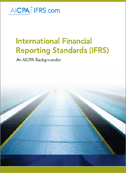TWO SIDES OF THE STORY
Growing interest in the global acceptance of a single set of robust accounting standards comes from all participants in the capital markets. Many multinational companies and national regulators and users support it because they believe that the use of common standards in the preparation of public company financial statements will make it easier to compare the financial results of reporting entities from different countries. They believe it will help investors understand opportunities better. Large public companies with subsidiaries in multiple jurisdictions would be able to use one accounting language company-wide and present their financial statements in the same language as their competitors. Another benefit some believe is that in a truly global economy, financial professionals including CPAs will be more mobile, and companies will more easily be able to respond to the human capital needs of their subsidiaries around the world. Nevertheless, many people also believe that U.S. GAAP is the gold standard, and something will be lost with full acceptance of IFRS. However, recent SEC actions and global trends have increased awareness of the need to address possible adoption. According to a survey conducted in the first half of 2008 by Deloitte & Touche among chief financial officers and other financial professionals, U.S. companies have an interest in adopting IFRS and this interest is steadily growing. Thirty percent would consider adopting IFRS now, another 28 percent are unsure or do not have sufficient knowledge to decide, while 42 percent said they would not. Still, an AICPA survey conducted in Fall 2008 among its CPA members shows a significant and positive shift in the number of firms and companies that are starting to prepare for eventual adoption of IFRS. A 55 percent majority of CPAs at firms and companies nationwide said they are preparing in a variety of ways for IFRS adoption, an increase of 14 percentage points over the 41 percent who were preparing for change, according to an April 2008 AICPA survey. Another concern is that worldwide, many countries that claim to be converging to international standards may never get to 100 percent compliance. Most reserve the right to carve out selectively or modify standards they do not consider in their national interest, an action that could lead to incomparability — the very issue that IFRS seek to address. View International Financial Reporting Standards (IFRS) — An AICPA Backgrounder [PDF - 375k]
|

